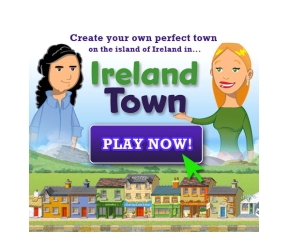Ahead of the game: tourist agency gets visitors playing in ‘Ireland Town’
Fair play to Tourism Ireland which is said to be the first tourist board to create a social game that promotes the country as a holiday destination. The agency, which understands that digital media is fundamentally changing the way people make their holiday decisions, says one of its social media successes has been its Farmville-style game called ‘Ireland Town’.
Launched on Facebook on St Patrick’s Day 2011, Ireland Town is described as the first social game ever to be created by a tourist board. In May this year, the organisation shared that the game had over 215,000 players.
EyeforTravel’s Ritesh Gupta talks to Brian Harte, Tourism Ireland’s head of customer engagement and e-marketing about the success of their campaign.
EFT: How do you assess the utility of social gaming from a travel marketer’s perspective?
BH: This is interesting from two perspectives: social gaming can assist the deeper discovery of the destination and extend the reach of the destination content via social interaction.
EFT: How can social gaming work as part of a marketing campaign?
BH: Social gaming can be used as a competition or data capture platform. For destination marketing organisations, it can also be used as a partner platform –with tourism partners represented throughout the game experience. Therefore, a range of conversion outcomes are available, depending on the specific objectives identified.
There's a huge array of data available from social gaming. It is very important to select the most relevant metrics that represent full and intermediate goal success.
EFT: How did you end up working on the Farmville-style game called ‘Ireland Town’?
BH: We were looking for a digital project to enhance our global St Patrick's Day promotions. Several concepts were considered with ‘Ireland Town’ deemed the best, primarily because it complemented our Facebook goals. We had an objective to grow our Facebook audience for 2011. In addition, the social-gaming audience tends to be slightly older and female and matched our target demographics quite closely.

EFT: What were the main challenges? What did you learn from such a campaign?
BH: It was an ambitious campaign to implement, particularly given that it had to work in five languages and there were different incentives for each of the five markets in which it was promoted. Naturally, there were some technical difficulties in the early days. Our success in this area was in ensuring good customer support. We answered any queries the players had, particularly with bugs they encountered. We took to calling them 'leprechauns’ (Irish folklore fairies) in the system which was a bit of fun.
More importantly, we addressed any bugs quickly and kept players informed. We also iterated some elements of the game-play to adapt the game 'economy', based on feedback, to make it more rewarding. The game-play and iterations gave us an insight into how the Zyngas of the world need to operate and it gave us new respect for them! It really can get very complex, but continuous development is essential in any long-term gaming initiative.
EFT: How did you end up going for a Facebook-oriented initiative?
BH: We had selected Facebook as one of the social platforms we support and put long-term investment in. It was the only one of those platforms that enabled this depth of campaign and was an organisational KPI (key performance indicator) for the year. However, an open-graph enabled gaming platform may hold some potential in the future.
EFT: Can you provide an insight into the planning and execution phase of ‘Ireland Town’?
BH: It was a really quick turnaround. The decision about ‘Ireland Town’ was made in mid-January and we were live on March 14. We stayed very close to the developers and were involved all the way; we wouldn't have been live with a satisfactory solution if we weren't. Our media buy and PR was an equally quick initiative done in parallel.
We got good PR and publicity around the launch because we were the first tourist board to do something like this. Our media spend was part cost per acquisition in game advertising, part Facebook advertising. The in-game advertising was in effect wasted spend. It was based on in-game incentives to join our game – it soon became clear that other gamers were coming for the incentive only and leaving quickly.
One of the successes was unexpected. Very early on, we noticed that the sharing of game assets was going very well; this allowed us to follow through on the creation of some more in order to add depth to our offering.
EFT: What sort of game did you develop? What were the main elements of engagement and how did it help you in meeting your goals?
BH: The game was based around creating your own 'Ireland Town' – which you could build up from achievements within the game economy. Some of the achievements were realised by 'travelling' in the game to destinations around Ireland and by carrying out some simple tasks. These unlocked more elements of the economy and so on. The social dimension was achieved by inviting friends to be your 'hotel manager' or to organise an event in your 'bar'.
The game-play was fairly unsophisticated and a concern was whether players with expectations set by the likes of FarmVille would tolerate the reduced experience. This was a valid concern but we don't know the scale of impact it's had without comparing our data with Zynga's!
The key elements of engagement were with the destinations around Ireland. We have what we call the 'empty-map problem' where many consumers and potential holidaymakers around the world are aware of Ireland but don't know it in very much depth. The in-game discovery of destinations and locations around the country, and the sharing of destination assets, worked to address this issue.

